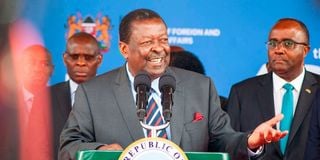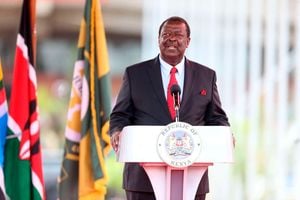
Prime Cabinet Secretary and Cabinet Secretary for Foreign and Diaspora Affairs Musalia Mudavadi addresses journalists at the Ministry of Foreign and Diaspora Affairs Headquarters in Nairobi on November 26, 2024.
Kenya says it is renewing its diplomacy to adapt to the changing world, even though a new foreign policy also sticks to the age-old traditions, suggesting a blend of practices from the past.
The document due to be launched on December 2 is undergoing a final validation, with stakeholders asked to add an area of interest they think should matter. But it already drew up a list of seven focal areas which will identify Kenya’s kind of play in international arena.
These focal areas were previously known as pillars of the outgoing foreign policy. And they include peace and security, economic diplomacy, environment and climate change, and socio-cultural diplomacy.
The new document has split up some of the areas initially pooled in economic diplomacy such as digital diplomacy, meant to focus on attracting tech organisations in Nairobi and health diplomacy meant to negotiate affordable medical products such as vaccines, for example.
At a stakeholder consultative forum this week, government officials argued they have had to rework the policy to reflect the needs of Kenya, and adjust to the modern world.
“Foreign policy is a public good, but it is also very elusive,” argued Musalia Mudavadi, Kenya’s Prime Cabinet Secretary and Cabinet Secretary for Foreign and Diaspora Affairs.
“Looking back, our Foreign Policy has been detached, mysterious and closed to the public, making it actually foreign to Kenyans. We have decided to break from this past situation and take foreign policy to the people to ensure that we move along with Kenyans in our diplomatic engagements,” Mudavadi said at a function at the Jomo Kenyatta International Convention Centre (KICC).
The draft policy says it is inspired by the rationale of a changing world, new problems and new partnerships.
The need to respond to globalisation and its ever-changing characteristics, it says, has necessitated Kenya to adjust its foreign policy accordingly.
New global security threats including, regional wars and conflicts, transnational organised crimes (TOCs) like violent extremism, drug and human trafficking, money laundering, emerging technologies, are among the influences on the policy.
“The emergence of internal conflicts and civil wars, political instability, unconstitutional changes of governments, and secessionist movements in the region and beyond, have also contributed to the new approach.”
Traditionally, Kenya often supported peaceful means of resolving conflicts, backed integration and supported the UN and other multilateral systems.
This will continue. But Nairobi has also identified blue economy as a major issue to pursue in the international arena. This, climate change and digital economy are among the new areas.
Nairobi has had special envoys for this issues, often experts drawn from the line fields. Now it will be a part of the foreign policy, and probably part of the job for the diplomats.
Kenya has also focused on health diplomacy, traditionally a domestic function of the ministry of health. The government says it is part of the experiences learnt from Covid-19 pandemic when African countries struggled to get vaccines and text kits.
“Kenya’s engagement in global health diplomacy is guided by lessons learned from the COVID-19 pandemic and our commitment to enhancing inclusion and equity by promoting public and private investments to expand access to quality healthcare, address disparities, and strengthen domestic health systems while partnering to address pandemics and emerging public health challenges.”
Some of the provisions in the policy may be subject to political realities however. For example, while Kenya pledges to “remain a peaceful nation - at peace with ourselves, our neighbours, and friends abroad,” the relations with neighbours have often depended on who is in office.
Nairobi has struggled to keep ties with Sudan and the Democratic Republic of Congo, with both countries accusing Kenya of fanning rebels.
Kenya also bickered with Somalia, although the relations improved as soon as both sides changed their administrations at elections in 2022.
“At its core, Kenya’s foreign policy is more than the management of relations with other nations - it is about shaping a destiny for present and future generations that aligns with our national interests,” President William Ruto told an audience on Thursday.
“This policy, therefore, ensures that diplomatic engagements deliver tangible benefits to every Kenyan, unlocking the power of cooperation, the promise of partnerships, and the potential of a shared vision for a prosperous, interconnected future.”
Kenya’s interests, it says is to protect its territorial integrity, maintain stability, gain economic prosperity, run affairs on rule of law, build institutions for better governance, protect environment and mitigate climate change, collaborate with neighbours and partners, co-exist peacefully with neighbours, resolve conflicts peacefully and contribute in though leadership through institutions.
But Nairobi admits it may have to look into its own mirror on how it hired diplomats for the job. There has often been a silent turf war between career diplomats and political appointees. It is something Mudavadi said may have to be looked at.
"We are also facing interesting challenges. There are critical issues that we must deal with, for example, how can we motivate our foreign service, how can we anchor our men and women out there? “What is a professional foreign service? Do we pursue career diplomats or fill the service with villagers? Is it time to discuss the ratio? Do we work with trained people? And to what extent do we infuse new blood? Does our foreign service reflect the face of Kenya? How does it reflect on gender? What happens when you don't resource a foreign service? Do you compromise a nation?"
For a start, Mudavadi said the Foreign Service Act must be amended to be in line with the policy. One controversial inclusions in the 2020 law is that it bars dual nationals from heading missions abroad.
Before this law, ambassadors and high commissioners were often not considered state officers, the rank of public officers barred from holding two passports at the same time.
“If you are to ask me, can you run away from the civil society? I think it is not possible anymore. We are living in these new times and it is absolutely important that there are new times. In these new times, let's also crystalise a new gem for Kenya."
Kenya intends to publish a Sessional Paper to draw “attention to the cost implications of our foreign policy formulation and implementation,”, suggesting adequate budgetary allocations to foreign service programmes.
But as usual, such a budgetary allocation will also increase scrutiny on the foreign service, requiring regular reporting on achievements.






